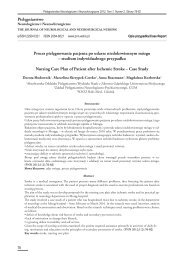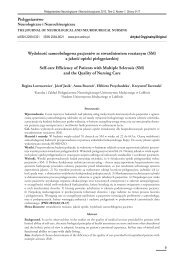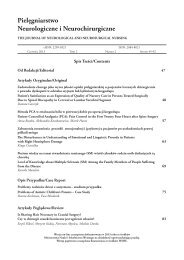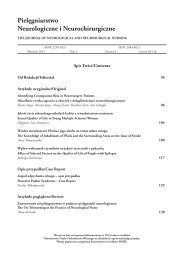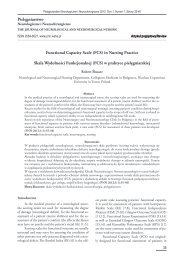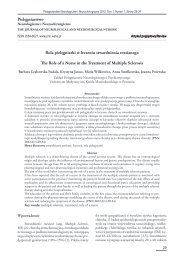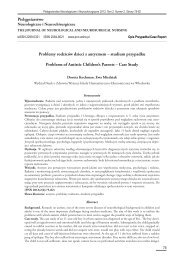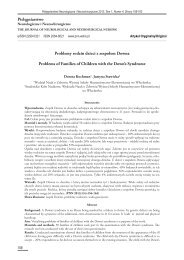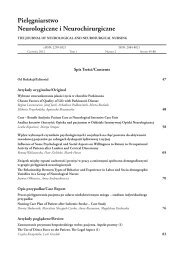1 - PNN - Wyższa SzkoÅa Humanistyczno-Ekonomiczna
1 - PNN - Wyższa SzkoÅa Humanistyczno-Ekonomiczna
1 - PNN - Wyższa SzkoÅa Humanistyczno-Ekonomiczna
Create successful ePaper yourself
Turn your PDF publications into a flip-book with our unique Google optimized e-Paper software.
Skrzypek-Czerko i wsp. / <strong>PNN</strong> 2013, Tom 2, Numer 1, Strony 18-26<br />
[19] Nilsson I., Axelsson K., Gustafson Y., Lundman B.,<br />
Norberg A. Well-being, sense of coherence, and burnout<br />
in stroke victims and spouses during the first few<br />
months after stroke. Scandinavian Journal of Caring<br />
Sciences. 2001;15(3):203-214.<br />
[20] Bakas T., Austin J.K., Okonkwo K.F., Lewis R.R.,<br />
Chadwick L. Needs, concerns, strategies, and advice<br />
of stroke caregivers the first 6 months after discharge.<br />
Journal of Neuroscience Nursing. 2002;34(5):242–251.<br />
[21] Wolfe C.D. The impact of stroke. British Medical Bulletin.<br />
2000;56(2):275-286.<br />
[22] O’Connell B., Baker L., Prosser A. The educational<br />
needs of caregivers of stroke survivors in acute and<br />
community settings. Journal of Neurosciene Nursing.<br />
2003;35(1):21-28.<br />
[23] Suh M., Kim K., Kim I., Cho N. Caregiver’s burden,<br />
depression and support as predictors of post–stroke<br />
depression: a cross–sectional survey. International Journal<br />
of Nursing Studies. 2005;42(6):611-618.<br />
[24] Grabowska-Fudala B., Jaracz K. Obciążenie osób sprawujących<br />
opiekę nad chorymi po przebytym udarze mózgu<br />
– wyniki wstępne. Udar Mózgu. 2007;9(1):24-31.<br />
[25] Grabowska-Fudala B., Jaracz K., Górna K., Miechowicz<br />
I. Obciążenie osób sprawujących opiekę nad<br />
chorymi po przebytym udarze mózgu – wyniki badań.<br />
W: Skrzypek-Czerko M., Ślusarz R. (Red.), Pielęgniarstwo<br />
w neurologii i neurochirurgii – wybrane zagadnienia.<br />
UMK, CM, Bydgoszcz 2009;31-42.<br />
[26] Tooth L., Russell A., Lucke J., Byrne G., Lee C., Wilson<br />
A., Dobson A. Impact of cognitive and physical<br />
impairment on carer burden and quality of life. Quality<br />
of Life Research. 2008;17(2):267-273.<br />
[27] Jaracz K., Kozubski W. Znaczenie wsparcia społecznego<br />
dla jakości życia chorych po udarze mózgu. Przegląd<br />
wybranych badań eksperymentalnych. Neurologia<br />
i Neurochirurgia Polska. 2006;40(2):140-150.<br />
[28] Hupcey J. Clarifying the social support theory-research<br />
linkage.<br />
[29] Helgeson V.S. Social support and quality of life. Quality<br />
of Life Research. 2003;12(Suppl. 1):25-31.<br />
[30] Langford C.P., Bowsher J., Maloney J.P., Lillis P.P. Social<br />
support: a conceptual analysis. Journal of Advanced<br />
Nursing. 1997;25(1):95-100.<br />
[31] Rodgers H., Bond S., Curless R. Inadequacies in the<br />
provision of information to stroke patients and their<br />
families. Age and Ageing. 2001;30:129-133.<br />
[32] Drummond A., Lincoln N., Juby L. Effects of a stroke<br />
unit on knowledge of stroke and experiences in hospital.<br />
Health Trends. 1996;28:26-30.<br />
[33] O’Mahony P.G., Rodgers H., Thomson R.G., Dobson<br />
R., James O.F.W. Satisfaction with information<br />
and advice received by stroke patients. Clinical Rehabilitation.<br />
1997;11(1):68-72.<br />
[34] Skrzypek M., Nyka W.M., Wilczewska L. i wsp.<br />
Wsparcie społeczne pacjentów po udarze mózgu<br />
w okresie hospitalizacji (wyniki wstępne). Udar Mózgu.<br />
2007;9(1):32-41.<br />
[35] Zimond A.S., Snaith R.P. The Hospital Anxiety and<br />
Depression Scale. Acta Psychiatrica Scandinavica.<br />
1983;67(6):361-370.<br />
[36] Majkowicz M. Praktyczna ocena efektywności opieki<br />
paliatywnej – wybrane techniki badawcze. W: de Walden-Gałuszko<br />
K., Majkowicz M. (Red.), Ocena jakości<br />
opieki paliatywnej w teorii i praktyce. Akademia Medyczna<br />
Gdańsk, Gdańsk 2000;21-42.<br />
[37] Pasikowski T. Polska adaptacja kwestionariusza Masłach<br />
Burnout lnventory. W: Sęk H. (Red.), Wypalenie<br />
zawodowe. Przyczyny, mechanizmy, zapobieganie.<br />
PWN, Warszawa 2006;135-149.<br />
[38] Savicki V., Cooley E.J. Theoretical and research considerations<br />
of burnout. Children and Youth Services Review.<br />
1983;5: 227-238.<br />
[39] Iwanicki E.F., Schwab R.L. A cross validation study of<br />
the Maslach Burnout Inventory. Educational Psychological<br />
Measurement. 1981;41:1167–1174.<br />
[40] Dennis M., O’Rourke S., Slattery J., Staniforth T.,<br />
Warlow C. Evaluation of a stroke family care worker:<br />
results of a randomized controlled trial. BMJ.<br />
1997;314:1071-1076.<br />
[41] Grant J., Glandon G., Elliot T., Giger J., Weaver M.<br />
Caregiving problems and feelings experienced by family<br />
caregivers of stroke survivors the first month after<br />
discharge. International Journal of Rehabilitation Research.<br />
2004;27:105-111.<br />
[42] Gough S., McCann V., Seal J. Do elderly patients with<br />
non-insulin dependent diabetes mellitus benefit from<br />
diabetes group education? Australian Journal of Nutrition<br />
Dietetics. 1992;49:55-58.<br />
[43] Kalra L., Evans A., Parez I., Anne Melbourn A.,<br />
Patel A., Knapp M., Donaldson N. Training carers<br />
of stroke patients: randomised controlled trial.<br />
BMJ. 2004;328:1099.<br />
[44] Han B., Haley W. Family caregiving for patients with<br />
stroke. Review and analysis. Stroke. 1999;30(10):1478-<br />
1485.<br />
[45] Schultz R., Tompkin C.A., Rau M.T. A longitudinal study<br />
of the psychosocial impact of stroke on primary support<br />
persons. Psychology and Aging. 1988;3(2):131-141.<br />
[46] Visser-Meily A., Post M., van de Port I., van Heugten<br />
C., van den Bos T. Psychosocial functioning of spouses<br />
in the chronic phase after stroke: Improvement or deterioration<br />
between 1 and 3 years after stroke? Patient<br />
Education and Counseling. 2008;73(1):153-158.<br />
[47] van den Heuvel E., de Witte L., Schure L.M., Sanderman<br />
R., Meyboom-de Jong B. Risk factors for burnout<br />
in caregivers of stroke patients, and possibilities for<br />
intervention. Clinical Rehabilitation. 2001;15(6):669-<br />
-677.<br />
Adres do korespondencji:<br />
Marcelina Skrzypek-Czerko<br />
Zakład Pielęgniarstwa Neurologiczno-Psychiatrycznego GUM<br />
ul. Dębinki 7, 80-952 Gdańsk<br />
e-mail: marcelinaskrzypek@gmail.com<br />
Konflikt interesów: nie występuje<br />
Źródła finansowania: Grant promotorski MNiSW<br />
Nr NN404043936.<br />
Wkład autorski: Marcelina Skrzypek-Czerko A,B,C,E,F , Grzegorz<br />
Kozera F,G , Kamil Chwojnicki D,G , Walenty M. Nyka H ,<br />
Anna Roszmann C,D<br />
(A – Koncepcja i projekt badania, B – Gromadzenie i/lub<br />
zestawianie danych, C – Analiza i interpretacja danych,<br />
D – Analiza statystyczna, E – Napisanie artykułu, F – Poszukiwanie<br />
piśmiennictwa, G – Krytyczne zrecenzowanie<br />
artykułu, H – Zatwierdzenie ostatecznej wersji artykułu)<br />
Praca wpłynęła do Redakcji: 07.12.2012 r.<br />
Zaakceptowano do druku: 04.02.2013 r.<br />
26



